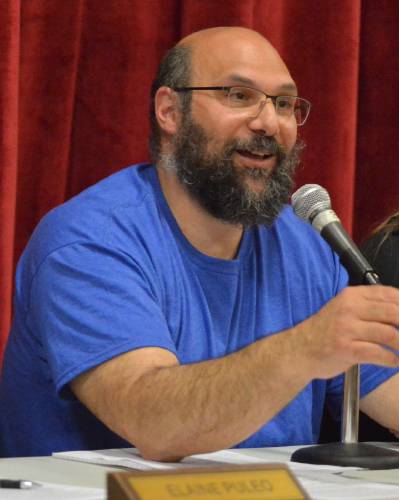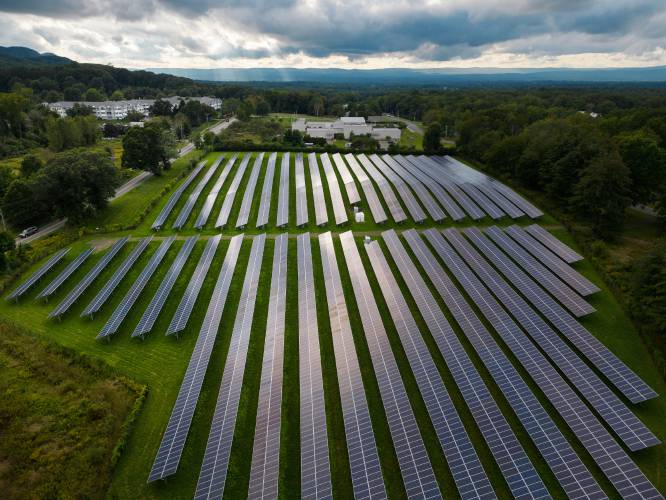No Assault & Batteries forum provides overview of new climate law
| Published: 12-11-2024 6:32 PM |
WENDELL — The citizens group that formed last year in opposition to a now-withdrawn proposal for a 105-megawatt battery storage facility held a virtual forum this week to shed light on local permitting and the role of municipal power in the wake of the new climate and clean energy law.
No Assault & Batteries welcomed Michael DeChiara, chair of Shutesbury’s Energy and Climate Action Committee and a member of the Shutesbury Planning Board, and Paul Fenn, founder and president of Williamsburg-based Local Power LLC, for a pair of presentations, which also included next strategies after the state Attorney General’s Office rejected a battery energy storage bylaw that Wendell voters had overwhelmingly approved in May. Nearly 60 members of the public attended the Zoom session to learn about municipal aggregation history in Massachusetts and to hear an overview of the new climate bill that was signed into law by Gov. Maura Healey.
“My view is there is probably little appetite to improve upon the law until it goes into effect [on March 1, 2026],” DeChiara said.
Describing himself as “a regular person who has done some research,” DeChiara explained the law will designate the state Department of Energy Resources as the regulator for small energy projects. The department will establish standards, requirements and procedures governing the siting and permitting of small clean energy infrastructure facilities by local governments, which will determine if a consolidated permit application is complete no later than 30 days following receipt.
A consolidated permit will be issued to large or small clean energy facilities and will include all municipal, regional and state permits that would otherwise need to be obtained individually in an effort to expedite the approval process.
DeChiara explained the law, called “An act promoting a clean energy grid, advancing equity and protecting ratepayers,” allows for constructive approval in the event that a reviewing board fails to act on a properly filed application within a specified time period. If a final decision is not issued within 12 months of the receipt of a complete permit application, a constructive approval permit can be issued by the local government. This includes the common conditions and requirements established by the Department of Energy Resources for the type of small clean energy infrastructure under review. DeChiara noted he feels the constructive approval deadlines are too firm and short in duration, one of the law’s shortcomings.
The consolidated permit process is untested, he said, and could easily require more time, as municipalities can engage experts as part of their due diligence throughout the regulatory process. DeChiara said a firm 12-month deadline does not reflect mutually agreed extensions. He added that the Department of Energy Resources reviews constructively approved projects quarterly, which he suggested is not often enough.
DeChiara’s presentation also noted that the law creates an office of environmental justice to enforce environmental justice principles. DeChiara said this is a good thing, but there is no equivalent office to consider rural issues.
Article continues after...
Yesterday's Most Read Articles
Under the law, municipalities will retain permit review responsibility for solar and winds projects under 25 megawatts, and battery storage projects under 100 megawatts. The state law does not invalidate local bylaws automatically — meaning whatever is not in conflict with the new law or future regulations can remain in local bylaws. However, permitting will need to comply with Department of Energy Resources-developed standards and a developer can appeal to the state if it does not agree with a local decision.
Fenn then took the reins to explain Community Choice Aggregation (CCA), a program municipalities can use to switch everyone to cleaner energy. He said nearly every western Massachusetts town is a CCA town.
Fenn said he hopes to enlist western Massachusetts communities in working toward an energy transition based on local control, to create an example for Boston — and an alternative to centralized climate solutions for the State House. Fenn also encouraged people to examine “methods that reduce your consumption of power.”
Bill Stubblefield, a No Assault & Batteries member who holds a doctorate in biology from Harvard University, spoke after the presentations and echoed the guest speakers’ messages.
“This is only the beginning of the conversation,” Stubblefield said, adding that the group can create “a better future for all of us.”
Reach Domenic Poli at: dpoli@recorder.com or 413-930-4120.








 ‘It’s a Wonderful Night in Turners Falls’ showcases village businesses, nonprofits
‘It’s a Wonderful Night in Turners Falls’ showcases village businesses, nonprofits Sackrey Construction Co. of Sunderland celebrating 35 years in business
Sackrey Construction Co. of Sunderland celebrating 35 years in business Photo: As darkness falls
Photo: As darkness falls Leverett residents rap Kittredge compound plans, urge caution as negotiations for 400 homes move forward
Leverett residents rap Kittredge compound plans, urge caution as negotiations for 400 homes move forward 
